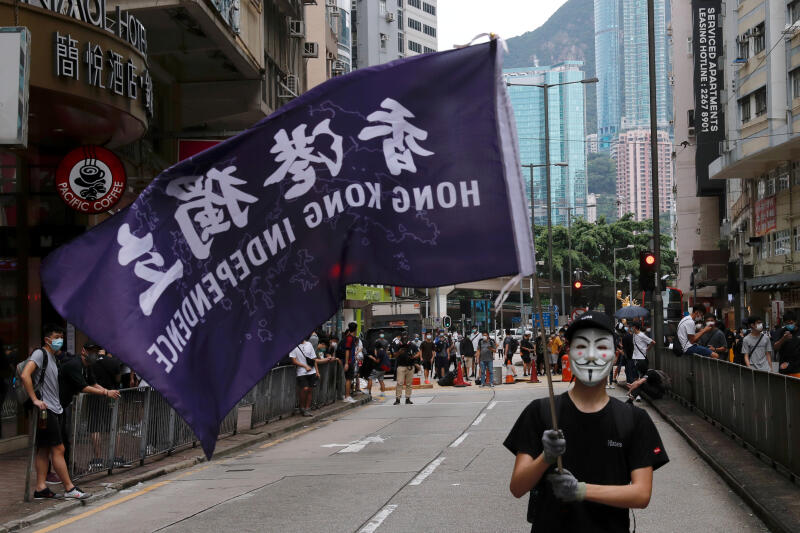HK opposition says US likely to strip Hong Kong's special status, pro-Beijing camp says little impact
Sign up now: Get insights on Asia's fast-moving developments

The US move, expected to be temporary, will give Beijing a chance to adjust its approach to Hong Kong, said Demosisto.
PHOTO: REUTERS
HONG KONG - The pro-democracy camp says a likely move by the United States to temporarily strip Hong Kong of its special status under US law leaves the ball in Beijing's court, but pro-establishment lawmakers believe such a decision will have little impact.
Pro-democracy group Demosisto, led by activist Joshua Wong, warned in a Facebook post on Thursday (May 28) that based on interactions with Congressional offices, President Donald Trump is considering a temporary suspension of Hong Kong's special status as a separate Customs territory under the US-Hong Kong Policy Act.
This comes as Beijing proposed a national security resolution last Friday that bypasses the Hong Kong Legislative Council to roll out a national security law in the city to deal with "treason, secession, sedition, subversion" against the Chinese government. The resolution was passed on Thursday.
The US move, expected to be temporary, will give Beijing a chance to adjust its approach to Hong Kong, said Demosisto.
It added: "Separately, the White House might consider invoking the International Emergency Economic Powers Act of 1977 to declare Hong Kong a 'national emergency' any time, thus offering the president more options to impose restrictions on economic activities with Hong Kong."
Given Beijing's likely knee-jerk reaction to mounting American pressure, Hong Kongers need to "not only prepare for potential economic blowbacks, but also for even more intense crackdown from China", the youth activist group warned.
Mr Wong, the group's secretary-general, told the media outside the Central Government Offices before the statement that the US decision would affect technological products used by both civilians and armed forces, among other things.
He said he expects a response from the US in one or two weeks, urging the global community to support opposition to Beijing's "evil law" as "now is the time to stand up and fight back".
Civil Human Rights Front vice-convenor Eric Lai told The Straits Times such a move by the US is "a death certificate to Hong Kong's autonomy warranted by the 'one country, two systems' principle".
The principle guarantees Hong Kong a high degree of freedoms for 50 years from when it was handed back to Beijing by Britain in 1997.
"The international community recognises the experiences of people in Hong Kong, that the city's rule of law and judicial independence are no longer reliable," Mr Lai said.
"It also implies that the Chinese government will soon pay a substantive price for pulling Hong Kong out of its reputation as a global financial hub and a liberal window for both the West and China."
Hong Kong's government rejected the US report late on Thursday, saying it strongly opposed the "sweeping remarks contained in the so-called report" which have misrepresented the constitutional relationship between the territory and Beijing.
"The threat of sanctions to achieve the purpose of interfering with the policy of another place is a violation of international law and international practice," a government spokesman said in a statement released shortly before midnight.
"Practically, in Hong Kong-US relationship, any sanctions are a double-edged sword that will not only harm the interests of Hong Kong but also significantly those of the US."
Former secretary for security and current executive councillor Regina Ip believes suspending the city's special status, as well as possible US sanctions, will have little impact on Hong Kong.
Although the US trade surplus with Hong Kong exceeded US$26 billion (S$37 billion) last year, Hong Kong deals mostly in re-exports in terms of trade with the US, she said.
Mrs Ip added that she does not believe the US will sanction Hong Kong officials or lawmakers over the controversial law.
Lawmaker Holden Chow noted that the US seems to be threatening Hong Kong with the proposed move: "The US, as a foreign power, cannot and should not interfere in Chinese internal affairs, interfere in Hong Kong matters."
He added that the status given to Hong Kong by China under the "one country, two systems" principle, has nothing to do with the US.
When asked if the ball now lies in Beijing's court, Associate Professor Alfred Wu of the Lee Kuan Yew School of Public Policy said: "I don't think so because the US is clear that Beijing will pass the law and also, it's unlikely that Beijing will withdraw the proposed legislation."
A US response will be inevitable, he said, adding that the Americans will have to decide between imposing sanctions and protecting Hong Kongers' interests.
If the US imposes restrictions only on ad-hoc Customs policy and does not revoke the separate Customs territory status as it now stands in the US-Hong Kong Policy Act, the damage to Hong Kong would be minimal but it would cause greater damage to the mainland, Prof Wu noted.
Under the US-Hong Kong Policy Act, the US sees Hong Kong as separate from the mainland in areas like politics, law and trading. It is why Hong Kong is a separate Customs area and has the right to buy sensitive tech from the US, unlike the mainland.
US Secretary of State Mike Pompeo said on Wednesday (May 27) that the State Department no longer considered Hong Kong to have significant autonomy under Chinese rule, a sign that the Trump administration could end some or all of the US trade and economic relations with the territory.
He said this in a report submitted to Congress in accordance with the Hong Kong Human Rights and Democracy Act of 2019.
The Act requires the State Department to issue a report card on Hong Kong's freedoms and requires the president to impose sanctions on foreigners who undermine "fundamental freedoms and autonomy in Hong Kong".


